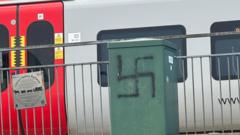Who Was Arrested for Painting Swastikas in the Town?

Published: 2025-09-11 10:20:10 | Category: wales
A 19-year-old man has been arrested after swastikas were spray-painted on public property in Maesteg, Bridgend, highlighting a troubling incident of racial intolerance in the community. The graffiti was discovered on a bus shelter and other locations, prompting a swift response from South Wales Police.
Last updated: 20 October 2023 (BST)
Key Takeaways
- A 19-year-old man was arrested for spray-painting swastikas in Maesteg.
- The graffiti was found on a bus shelter and public spaces.
- South Wales Police are investigating the racially aggravated public order offence.
- Local officials condemn the vandalism as damaging to community reputation.
- The incident has sparked discussions about public safety and community values.
Incident Overview
On Tuesday night, South Wales Police received reports of swastikas appearing in various locations throughout Maesteg. The offensive symbols were found on a bus shelter, within an open area of the bus station, and directly across from a local Chinese takeaway. The display of such symbols is widely recognised as a hate crime, and it has ignited concerns among local residents and officials.
Legal Implications
The arrest of the 19-year-old came shortly after the police launched an investigation into the matter. He has been taken into custody on suspicion of a racially aggravated public order offence. This type of offence is defined under UK law as behaviour that is intended to or likely to cause harassment, alarm, or distress to individuals based on their race or ethnicity. The legal framework addresses the seriousness of such acts, aiming to deter future incidents.
Community Response
The local community has responded with a mix of disappointment and anger. Inspector Gregory Methven of South Wales Police stated, "This deeply offensive behaviour is totally unacceptable and will not be tolerated." His remarks highlight the determination of law enforcement to address hate crimes decisively and support community values.
Local Councillor's Statement
Councillor Abedalkarim Fadhel expressed frustration over the incident, labelling it a manifestation of "small-minded individuals" who tarnish the community's reputation. He emphasised that such vandalism serves no purpose other than to damage public spaces, squander taxpayer money, and negatively impact the town's image. His comments reflect the sentiments of many residents who are proud of Maesteg and wish to see it flourish.
The Wider Implications of Hate Symbols
Vandalism involving hate symbols like swastikas can have broader implications for community cohesion and public safety. These acts not only distress those directly targeted but also create a climate of fear and division. Public spaces, which should foster inclusivity and safety, are instead marred by symbols of hatred, prompting discussions about how communities can better protect themselves against such incidents.
Addressing Hate Crimes in the Community
To combat hate crimes, communities must engage in proactive measures, including educational programs and awareness campaigns. Understanding the history and impact of hate symbols can help individuals recognise the seriousness of these acts and discourage similar behaviour in the future. Local authorities can also work with community organisations to create safe spaces for dialogue and healing.
What Happens Next?
Following the arrest, the investigation will continue as police assess the extent of the vandalism and gather evidence. Local authorities may consider additional measures, such as increased surveillance in public areas or community outreach initiatives, to prevent future incidents. It is crucial for residents to remain vigilant and report any suspicious activities to law enforcement, ensuring their community remains safe and welcoming.
Conclusion
The recent incident of swastikas spray-painted across public spaces in Maesteg serves as a stark reminder of the work that remains to be done in combating hate and intolerance. Both law enforcement and local leaders are committed to addressing these issues head-on, fostering a community that values inclusion and respect. As residents reflect on this event, it raises important questions about how they can collectively uphold these ideals in the face of adversity.
As communities across the UK grapple with similar issues, the need for unity and understanding has never been more critical. It calls for everyone to take a stand against hate and work towards a more inclusive society. How can we ensure that our towns reflect our shared values of respect and acceptance? #HateCrime #CommunityUnity #PublicSafety
FAQs
What is a racially aggravated public order offence?
A racially aggravated public order offence involves behaviour that is intended to cause harassment, alarm, or distress to individuals based on their race or ethnicity. It is treated seriously under UK law.
What can communities do to prevent hate crimes?
Communities can implement educational programs, promote awareness, and create safe spaces for discussion. Engaging local organisations can also foster a culture of inclusivity and respect.
What should I do if I witness vandalism in my area?
If you witness vandalism, especially of a hate-related nature, report it to local law enforcement immediately. Providing details such as location and time can aid in investigations.
How do hate symbols affect communities?
Hate symbols can instil fear and division within communities, leading to a breakdown of trust and safety. They can also discourage individuals from participating in public life and community activities.
What is the role of local authorities in addressing hate crimes?
Local authorities are responsible for enforcing laws against hate crimes, providing resources for victims, and implementing community outreach programs to promote understanding and tolerance.



